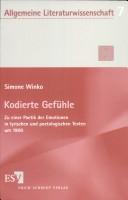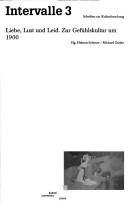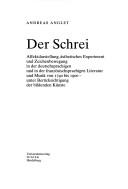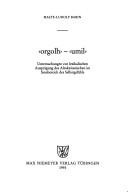| Listing 1 - 7 of 7 |
Sort by
|

ISBN: 3503061878 Year: 2003 Publisher: Berlin : Erich Schmidt,
Abstract | Keywords | Export | Availability | Bookmark
 Loading...
Loading...Choose an application
- Reference Manager
- EndNote
- RefWorks (Direct export to RefWorks)
Poésie allemande --- EMOTIONS DANS LA LITTERATURE --- 19e siècle --- 20e siècle --- Histoire et critique

ISBN: 3933146119 Year: 1999 Publisher: Kassel : Kassel University Press,
Abstract | Keywords | Export | Availability | Bookmark
 Loading...
Loading...Choose an application
- Reference Manager
- EndNote
- RefWorks (Direct export to RefWorks)
Die Beiträge des vorliegenden Bandes zielen mit der Frage nach kulturellen Repräsentationen von Empfindungen im allgemeinen bzw. nach der Gefühlskultur um 1900 im besonderen auf eine Kategorie mit religiösen, ästhetischen, moralischen, philosophischen, anthropologischen und naturwissenschaftlichen Dimensionen. Bestimmte Phänomene, die sich in der Gefühlskultur der Jahrhundertwende beobachten lassen, berechtigen zur Annahme eines ersten "Informalisierungsschubes" (N. Elias) um 1900. Der neue Modus der repressiven Freizügigkeit bzw. freizügigeren Repression geht einher mit einer neuen Qualität der Differenz von Fühlen, Handeln und Beobachten. Zugleich scheint sich allmählich ein Wandel von einem bislang vor allem durch Textmedien zu einem zunehmend durch Bildmedien bestimmten Gefühlskult zu vollziehen. Im Mittelpunkt stehen neben literarischen Formationen und realhistorischen Betrachtungen des Fühlens, Liebens, Leidens und der Lust, auch kulturelle Repräsentationen, Imaginationen und Projektionen in und durch Bilder (Illustrierte, Photos, Film). Diese Rede von und über Liebe, Lust und Leid ist als Element des kulturellen Selbstbeschreibungsprogramms um 1900 zugleich Ausdruck von Zivilisationskritik und negativer Utopie.
LITTERATURE ALLEMANDE --- AMOUR DANS LA LITTERATURE --- EMOTIONS DANS LA LITTERATURE --- SEXE DANS LA LITTERATURE --- 20E SIECLE --- 19E SIECLE --- HISTOIRE ET CRITIQUE
Book
ISBN: 3825312860 9783825312862 Year: 2002 Volume: 25 Publisher: Heidelberg: Winter,
Abstract | Keywords | Export | Availability | Bookmark
 Loading...
Loading...Choose an application
- Reference Manager
- EndNote
- RefWorks (Direct export to RefWorks)
Emoties in de literatuur --- Emotions dans la littérature --- Emotions in literature --- Elegiac poetry, English --- History and criticism --- Pope, Alexander, --- Criticism and interpretation --- -Emotions in literature --- English elegiac poetry --- English poetry --- Pope, Alexander --- -Pope, Alexander --- Emotions in literature. --- History and criticism. --- Criticism and interpretation. --- Elegiac poetry [English ] --- Popiĭ, Aleksandr, --- Barnivelt, Esdras, --- Poup, Aleksandr, --- Elegiac poetry, English - History and criticism --- Pope, Alexander, - 1688-1744 - Criticism and interpretation --- Pope, Alexander, - 1688-1744

ISBN: 3825315142 9783825315146 Year: 2003 Volume: 194 Publisher: Heidelberg: Winter,
Abstract | Keywords | Export | Availability | Bookmark
 Loading...
Loading...Choose an application
- Reference Manager
- EndNote
- RefWorks (Direct export to RefWorks)
Die komparatistische und interdisziplinäre Untersuchung analysiert die Bedeutung des Schreis für die Erweiterung des künstlerischen Ausdrucksrepertoires und der ästhetischen Reflexion zwischen 1740 und 1900. Sowohl seine Beziehung zu bislang tabuisierten Themen als auch sein Status als Grenzphänomen fördern eine experimentelle künstlerische Gestaltung, die im Zeichen des Exzesses eine Eigendynamik entfaltet. Seine Legitimation als ästhetische Ausdrucksform bezieht er immer wieder aus wissenschaftlichen, technischen, sozialen sowie politischen Entwicklungen und Diskursen. Sie bestimmen auch die kulturellen Unterschiede und Wechselwirkungen der Wahrnehmungsmuster und ihrer Akzentsetzungen im deutschsprachigen und im französischsprachigen Raum.
Crying --- Emoties in de kunst --- Emoties in de literatuur --- Emotions dans l'art --- Emotions dans la littérature --- Emotions in art --- Emotions in literature --- Gehuil --- Pleurs --- Weeping --- Literature, Comparative --- German literature --- French literature --- Art and literature --- Music and literature --- Literature --- Dreams in literature --- History and criticism --- History and criticism. --- Aesthetics. --- German literature - 18th century - History and criticism --- German literature - 19th century - History and criticism --- French literature - 18th century - History and criticism. --- French literature - 19th century - History and criticism. --- Literature - Aesthetics.
Book
ISBN: 9789042932081 Year: 2016 Volume: 9 Publisher: Leuven Paris Bristol, CT Peeters
Abstract | Keywords | Export | Availability | Bookmark
 Loading...
Loading...Choose an application
- Reference Manager
- EndNote
- RefWorks (Direct export to RefWorks)
This volume addresses various aspects of the character of Medea and the presentation of her emotions in literature and in connection with Medea, of philosophical views on emotions and of the reception of these themes in the later European tradition. One of the articles discusses the presentation of Medea's emotions in Hellenistic literature, i.e. in Callimachus and Apollonius Rhodius. Three other papers focus on aspects of philosophy, ranging from Plato to Stoicism. The reception of Euripidean emotionality and the character of Medea in the later European tradition is the subject of two other articles, which focus on the Renaissance poet Maffeo Vegio and on the way in which Goethe models his Iphigeneia on the character of Medea.
Medea (Greek mythology) in literature --- Greek literature, Hellenistic --- Emotions in literature --- Médée (Mythologie grecque) dans la littérature --- Littérature grecque hellénistique --- Emotions dans la littérature --- Themes, motives --- Thèmes, motifs --- Emoties in de literatuur --- Médée (Mythologie grecque) dans la littérature --- Littérature grecque hellénistique --- Emotions dans la littérature --- Thèmes, motifs --- Classical literature --- History and criticism --- Medea. Consort of Aegeus, King of Athens (Mythological character) --- In literature --- Medea, --- In literature.
Book
ISBN: 3050026413 Year: 1994 Publisher: Berlin Akademie Verlag
Abstract | Keywords | Export | Availability | Bookmark
 Loading...
Loading...Choose an application
- Reference Manager
- EndNote
- RefWorks (Direct export to RefWorks)
Emoties in de literatuur --- Emotions dans la littérature --- Emotions in literature --- 875-21 --- Tragic, The, in literature --- Greek drama (Tragedy) --- -Orestes (Greek mythology) in literature --- Greek drama --- Griekse literatuur: tragedie --- History and criticism --- -Theory, etc --- Aeschylus. --- Aristoteles. --- Sophocles --- Aristoteles --- Eskhil --- Eschylus --- Aischylos --- Esquilo --- Eschilo --- Aiskhilos --- Eshil --- Æskílos --- Ajschylos --- Eschil --- Eschyle --- Äschylos --- Eskili --- Aiszkhülosz --- Eschylos --- Iskilos --- Эсхил --- אייסכילוס --- איסכילאס --- איסכילוס --- إيسخولوس --- ايسخيلوس --- Αἰσχύλος --- Contributions in concept of the tragic. --- 875-21 Griekse literatuur: tragedie --- Aristote --- Aristotle --- Aristotile --- Sofokles --- Sophocle --- Sofocle --- Sophokles --- Sofocles --- Orestes (Greek mythology) in literature --- History and criticism&delete& --- Theory, etc --- Aristotle. --- Sophocles. --- Ἀριστοτέλης. --- Aeschylus

ISBN: 3484522518 3110941236 9783484522510 Year: 1993 Volume: 251 Publisher: Tübingen: Niemeyer,
Abstract | Keywords | Export | Availability | Bookmark
 Loading...
Loading...Choose an application
- Reference Manager
- EndNote
- RefWorks (Direct export to RefWorks)
Emotions dans la littérature --- -Provencal poetry --- Emotions dans la littérature --- Provencal language --- -Civilization, Medieval, in literature --- Emotions in literature --- -Lemozin language --- Occitan language --- Old Occitan language --- Proensal language --- Lexicology --- Style --- History and criticism --- Civilization, Medieval, in literature --- Provençal language --- Provençal poetry --- Lemozin language --- Romance languages --- Provencal poetry --- Civilization, Medieval, in literature. --- Emotions in literature. --- Lexicology. --- Style. --- History and criticism. --- Poésie provençale --- Civilisation médiévale dans la littérature --- Histoire et critique --- Provencal language - Lexicology. --- Provencal language - Style. --- Provencal poetry - History and criticism. --- ANCIEN OCCITAN --- ORGOLH --- UMIL --- Littérature occitane --- Ancien occitan --- Poésie provençale. --- Provençal (dialecte) --- Émotions --- Thèmes, motifs. --- Lexicologie. --- Dans la littérature.
| Listing 1 - 7 of 7 |
Sort by
|

 Search
Search Feedback
Feedback About UniCat
About UniCat  Help
Help News
News